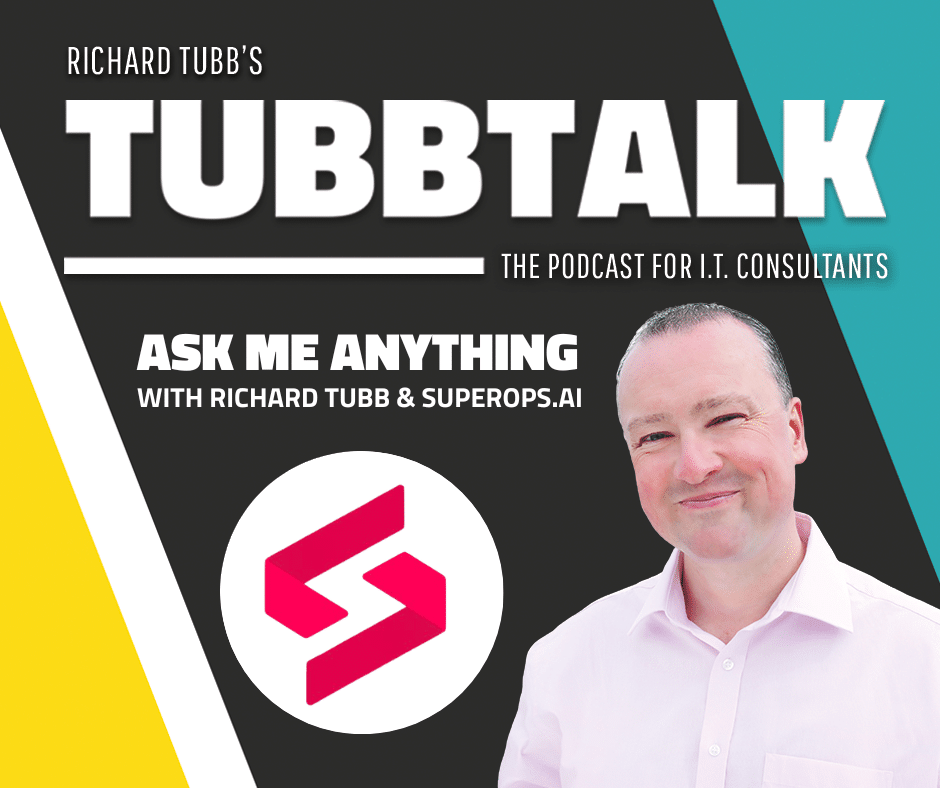As part of SuperOps’ new Community initiative, Richard Tubb took part in an ‘Ask Me Anything’ webcast where he welcomed those in attendance to submit their questions.
The questions covered everything to do with growing and running a successful MSP (Managed Service Provider) business, as well as the trends to look out for in the future.
There were some great insights covering marketing and growth, prioritising what’s important in your business, and the rising trends in cybersecurity and artificial intelligence.
Here’s what Richard had to say.
Ask Me Anything – Q&A
To kick things off, Richard gave us a brief bit of background on his journey as a successful MSP owner. From starting out as a break-fix one-man-band, right up to selling his business.
From there he became a consultant, speaking to MSP owners and advising them on how to grow their businesses and avoiding some of the mistakes he made in his early days.
Richard then answered some questions. Some were asked live by the audience, and others had been submitted earlier from contributors who were unable to attend the live broadcast.
We’ve included the replay of the live broadcast here in this article.
While for those who prefer to read, we’ve included the abridged Q&A for you below too.
Ask Me Anything with Richard Tubb – Replay
In case you missed the live broadcast, you can find the replay below:
Ask Me Anything – Audio Version
Q1: What are the key challenges for today’s MSP, and how can they overcome them?
Firstly, we’re aware of the economic challenges facing us all at the moment. Fortunately, MSPs are fairly recession-proof in times like these. Our clients’ businesses often rely on us as their technology providers to be able to keep them running.
Though some might choose to prioritise elsewhere, for the most part, their technology providers are an essential part of their strategy.
Another challenge for today’s MSP is in how much we do ourselves, and how much we entrust to our teams and outsourced partners. If you want to be successful, you need to automate or delegate.
If we’re not careful, we can be too busy being involved in the day-to-day operations of our business, and not have the time to focus on the important things. Such as sales and marketing and business development. Therefore, it’s a must to invest in developing the systems to enable others to do what they need to do to make your MSP a success.
Q2: What did you use for your RMM and PSA tools when you ran your MSP, and have you found any gaps in the SuperOps platform?
When I first started running my MSP, I put off using a PSA (professional services automation) tool for a long time. This was a mistake, because we soon discovered the value of PSA tools in allowing you to organise and manage your services much more effectively.
We eventually settled on Connectwise for our PSA tool. It was a great product with quite a lot of features, but we managed well with it at the time.
The RMM (remote monitoring and management) tool we used was called HoundDog, but it doesn’t exist anymore. However, it reminds me of the sort of products SuperOps has developed. In that, you can get it to do 80% of what you need your RMM tool to do straight out of the box.
This is a great thing for MSPs because we often find ourselves very time-poor. We don’t have the time to invest in configuring tools, we just need them to go to work.
As for whether there are gaps in the SuperOps platform, of course, there are. However, I’ve been working with SuperOps and discovered that from feedback that I’ve given them, they’ve already made progress in resolving and plugging those gaps. They are incredibly responsive to MSPs’ needs and are working all the time to make the product better for their partners.
Q3: Are there any trends that you’re seeing for new tools in the MSP workspace?
I think the two biggest trends we’re seeing at the moment are AI and cybersecurity.
In terms of AI, it’s not really been a massively talked about trend until recently, despite being around for a while now. It’s only since ChatGPT has made a splash that the industry is really taking notice of AI and machine learning. Even MSPs saw AI as something of a gimmick, at first.
However, now they’re realising the potential that AI presents for making things faster, better, and cheaper. Those companies that invested in the technology before the bubble arrived are now starting to see the rewards. And, of course, SuperOps is one of those companies.
Cybersecurity is another big trend on the rise. All MSPs and technology service providers need to carefully consider cybersecurity, as it’s become an absolutely essential and a priority for all businesses.
Q4: How can MSPs avoid wasting time in running their businesses?
We’ve all been guilty of saying we’re ‘too busy’. But if we’re busy doing the work that others should be doing, instead of focusing on business growth, then that’s an issue. Most MSP business owners are passionate about technology, and it’s why we’re a part of this industry.
However, if we’re spending time resolving tickets because it involves an interesting tech puzzle, we aren’t making the best use of our time. It’s easy to do the things we’re comfortable doing while putting off things we don’t like so much.
We should trust the engineers we have employed to do that investigative work, while we focus on business development, and put a stop to the procrastination.
Q5: My social media is not generating leads for my business, what should I do?
A common misconception about social media for businesses is that it’s not there to say: “hey, look at me and what I do!” It’s there for having conversations with prospective clients.
People only tend to do business with people that they know, like and trust. So social media is there for you to demonstrate your expertise and prove your worth through conversations. It’s not about you talking at them, but get involved in the conversations about the problems your clients are facing to build that trust.
Paul Green is very knowledgeable about this subject and talks about how to strike up these kinds of conversations on LinkedIn. You should check out his podcast.
Q6: How can I stand out from the competition amongst other local MSPs?
I meet a lot of MSPs at local peer groups and they all describe themselves in similar ways. However, the one distinction that sets you apart from your competition is you!
You are the ‘special sauce’ in your business that makes your customers choose you over the competition. The tools that you use and your geography can be largely irrelevant.
Your business is not going to be a good fit for everyone, as people have different preferences on how they like to work with others. How your website looks and your presence on social media can be a good start in showing who you are and what you do – the people behind the business.
Q7: When creating a website for my MSP, what is the one thing I should never miss out?
I know some of the things you should never do, from experts that I’ve spoken to in the industry.
Mark Copeman, the author of Helpdesk Habits, told me that you should avoid the ‘white teeth people’. These are the generic stock photos of people you find on boring corporate websites who look like models and don’t reflect what you or your staff do in your business.
Instead, you should use photography of your own people and offices to show your personality, who you are, and what you do.
What you should always include on your website is what you stand for, your history, and your culture. Mention what your business is all about, beyond the services you provide. What it is you value outside of your work?
You should also always include a ballpark pricing structure, because this indicates whether your services are in budget for prospective clients. It will eliminate those prospects buying on price alone, and limit prospective sales that fail over price.
Q8: How can I use AI to help with my MSP marketing, and should I even be using it?
You could use an AI prompt to write you a blog post, if you weren’t doing any yourself at the moment. But what the internet doesn’t need any more of is mediocre blog posts written by AI chatbots. People want to hear your personal take, not just the definitive answer to a technical problem.
However, when it comes to ideas for blogs you can find a wealth of content in your ticket system or PSA, because that’s where you’ve got real-life examples of problems you’ve solved.
How AI can help you in better ways is to ask things like: what are the top 5 questions people are asking at the moment? This will give you an outline about what to write about.
In our team, we’re looking at other ways to use AI in our marketing. Stephen McCormick, for example writes his long-form articles based on in-depth research. So, we’re looking at using AI to help collate that information from sources online that meet the brief we’re looking for.
To reiterate here, we’re not looking for AI to automate the process of writing the article for us. We’re using AI to help with a lot of the detail, which we can verify before we use it within the articles myself, Stephen and the rest of the team are putting together.
Q9: As a one-man-band MSP, what do you think should be your first hire?
When I ran my MSP fifteen years ago, I found myself bogged down in admin. So, my first hire was an office manager. Then I hired an engineer.
However, today you don’t need to hire a full-time person to help with areas of your business that need someone else to manage on your behalf.
Virtual administrators can be hired from anywhere in the world for a number of hours each week. These VAs can do those admin tasks that you need to get done, while you focus on other things. They’re a great option for one-man-band MSPs, because you pay them for the tasks you need to do, and so won’t cost a lot to retain.
Another option if you can’t afford another full-time engineer is to buddy up with another MSP. Either MSP can assist the other when extra support is required, or provide holiday cover, for example.
This can be a more cost-effective approach if you don’t have a regular enough stream of service requests from your clients.
Q10: Beside the technical posts, what else should we be posting across social media?
In answer to this question, I often refer to the book: They Ask You Answer by Marcus Sheridan. He explains that the best posts on social media are those that answer a question your audience has.
These questions are an opportunity for you to share your wisdom, experience and authority to help inform others.
Questions can include:
- What is the best budget laptop to buy for my mobile salesforce?
- How can I embed a video into a Google/PowerPoint slide?
- What steps can I take to shore up my Microsoft 365 defences against cybercriminals?
You don’t have to produce written content either. Video is the most powerful tool you can use for marketing on social media.
There are going to be some people who will say, “but if you’re giving away all of this advice for free, who’s going to pay you for your work?”
Those that appreciate and value the knowledge that you’re demonstrating, will also appreciate your dedication to doing a good job. Those that are just there to take that information and do it themselves were never going to become your customers anyway.
It’s much more valuable to build your reputation through social media posts that demonstrate your value to potential customers.
Q11: What marketing strategy would you recommend to a small MSP who can’t justify a full-time marketing assistant, but has had limited success with external agencies in the past?
A lot of people believe that marketing has to be a huge task for businesses. One that they must commit a lot of resources to.
The truth is, we’re marketing ourselves and our businesses more often that we probably realise.
For a small business, I’d suggest that everyone in your team commit to being partly responsible for marketing. Many businesses like to abdicate responsibility for marketing to an outside agency. They often do this before they’ve got a good idea about what will work for them.
It’s better to do that initial groundwork internally, testing the water to see what works. Only then can you confidently instruct an agency to carry it forward with their extra resources.
Q12: Many MSPs procrastinate, whilst also not using our teams to free us up. How would you suggest letting go of the vine?
As technical people we often find it difficult to let go of the work that stimulates our brains, our need to solve technical problems. It can be so tempting to procrastinate, and jump on a call, rather than focus on running the business.
To keep those boundaries, you should make appointments with yourself. An appointment is a commitment of time to focus on marketing, sending out sales invoices, and documenting processes.
Also, try changing your location for those activities so that you’re not in the office where your team can pester you. If you work from home, go to the public library or hire an office space to get this work done.
And turn off notifications. Each ping to your phone or device can take you twenty minutes to get your focus back onto what you were doing.
The Pomodoro Technique is a great productivity method in which you assign yourself tasks in 25 minutes time slots. Then there’s a 5-minute break before you start the next task. It allows you to focus on one thing and one thing only for 25 minutes, and avoids any distractions.
Q13: Alongside building your audience of potential clients, how important is it to build relationships with your peers in the industry? What are the benefits of investing time in this?
We’re fortunate to work in an industry where we can talk openly about our businesses in front of our competition. Not only that, but we offer advice and the benefit of our wisdom freely to others too.
We can do this because there is plenty of opportunities in managed services. Managed services community events are safe places to discuss best practices, compare tech, and debate which pricing models work. Communities like CompTIA, The Tech Tribe Network Group, to name jut a few, are where MSPs can come together to debate and collaborate.
Building relationships with my peers was the number one I did when growing my business. I was very fortunate to have some of the smartest people in the industry freely share their insights with me. And now, that’s what I’m doing – sharing some of my wisdom with others today.
A rising tide lifts all boats, so they say.
So, as this industry matures with increasing regulation in the near future, I would encourage you to get involved.
Join a community and learn from your peers. You will learn so much from them and grow your business much faster.
Ask Me Anything – Closing Remarks
Richard finished off the virtual broadcast by offering advice for anyone starting an MSP today.
Running an MSP can be the most rewarding job in the world. Most of us that start an MSP do so because we enjoying helping people. So, keep that focus when you’re building and growing your business.
Always have the aim to help people at the front of your mind. Ask ‘how can I make my customer’s lives easier?’ When you provide value to people in what you do, the revenue and new customers will keep rolling in.
Do You Have a Question for Richard?
The session was full of great questions, with some interesting and thought-provoking answers.
Did you watch the live session? If you missed it and have a burning question you’d like Richard to answer, please let us know in the comments.
If you want to know more about the SuperOps Community, click here to find out more.


















Comments